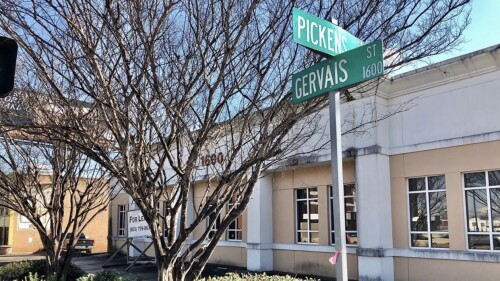Tracking the 2020 election results
Looking for the election results? Welcome to the party. We’re still waiting for the final word on a few races, and you can join us in anticipation by following along here.
The general election is Nov. 3.
We want you to be ready to cast your ballot with all the confidence in the world, so we’re breaking down all the 2020 election must-knows for you. In South Carolina, you’ll be voting for a Senate representative, Congressional House representatives, our local elections, and of course, the President of the United States. There are no ballot measures this year — AKA state amendments.
In this guide, you’ll find registration + polling information, maps of local voting districts, a breakdown of candidate priorities, candidate trackers to follow visits and debates, a timeline of important dates, and an election dictionary of terms you should know.
Basically, if you have a question about the upcoming election, this is your resource. So go ahead and bookmark it, and as always, reach out to us if you have any questions we didn’t answer.
Head to the polls
Not sure if you’re registered to vote? Check here.
Need to register? Learn how to do that here. Note: You have until 30 days prior to Nov. 3 to register.
Need an absentee ballot? Read all about how to get one here.
Waiting until election day? Polls will be open from 7 a.m. - 7 p.m. If you’re in line by 7 p.m., you will be able to vote. Note: Early voting polling places may be different from voting day polling places. Find your polling place here.
Looking for COVID-19 safety information? Find coronavirus updates from the South Carolina Election Commission here.
Candidates by district
Raise your hand if you’re a visual learner. 🙋♀️ To determine your districts, check out the maps + resources below, then use your districts to identify your candidates.
You can also identify your voting districts by checking your voter registration status or sample ballot. Find information on how congressional and state legislative district boundaries are established here.
South Carolina US Congressional districts
South Carolina House districts
Meet the candidates
Since you probably already know about the presidential candidates, we’re focusing on what you need to know on a local level. Keep reading for a rundown of South Carolina’s US Senate candidates, Congressional District candidates, and candidates running for other local seats. To identify candidate priorities, we relied on verified candidate questionnaires submitted to the nonpartisan site Ballotpedia + issues listed directly on candidate websites.
US Senate
Lindsey Graham (Incumbent) | Republican | Priorities: Supports major infrastructure bill to rebuild roads, bridges, airports. Promotes policies that will create jobs in SC, provide better pay for troops and favors healthcare that puts patients in charge of their medical choices.
Jaime Harrison | Democrat | Priorities: Protecting health care coverage, growing the middle class, protecting seniors, ending poverty + providing affordable education.
Bill Bledsoe | Constitution | No information available.
US House
District 2
Adair Ford Boroughs | Democrat | Priorities: Supports healthcare initiatives, bringing high speed internet to rural areas, providing access to higher education + skills training, combating climate change and improving healthcare options for veterans. Adair supports increasing access to high-quality, affordable child-care.
Joe Wilson (Incumbent) | Republican | Priorities: Supporting small businesses and creating jobs in SC, education initiatives to advance local education systems, immigration restrictions, strong national secretary + foreign affairs policy and providing more healthcare options to veterans. Wilson supports domestic production of natural resources, including the Keystone Pipeline.
Kathleen Wright | Constitution | Priorities: Supports the Second Amendment, state’s rights to handle local drug issues and keeping the federal government accountable. Wright supports strict immigration policy and believes in the importance of American sovereignty, or the consent of the governed.
District 5
Moe Brown | Democrat | Priorities: Supports equal healthcare for all aiming at 100% percent coverage and voter rights. Brown is pro-choice, reducing the cost of higher education and reshaping the education system to provide teachers a higher wage.
Ralph Norman (Incumbent) | Republican | Priorities: Votes in favor of limited government, individual liberties and sound financial policies.
District 6
James Clyburn (Incumbent) | Democrat | Priorities: Looking to expand the Rural Energy Savings Program, develop a third Heritage Corridor to highlight Revolutionary & Civil War sites. Working to make his 10-20-30 plan a permanent law.
Mark Hackett | Constitution | Priorities: Believes the US Government should be guided by the Constitution.
John McCollum | Republican | Priorities: Recruiting employers to District 6 to take advantage of the Opportunity Zone legislation. Better access to services, healthcare, education, infrastructure & quality of life.
State - Senate
District 18
Ronnie Cromer (Incumbent) | Republican | Priorities: Currently, Cromer serves on the following committees for the SC Senate: Chairman of the Banking and Insurance committee, member of the Finance committee, Fish, Game and Forestry committee and Rules committee.
Christopher Thibault | Democrat | Priorities: Supports digital privacy and encryption policies, education efforts including fair pay for all teachers, as well as providing healthcare to everyone and addressing climate change.
District 19
John Scott | Democrat | John Scott (incumbent) is running unopposed.
District 20
Benjamin Dunn | Republican | Priorities: Pro Second Amendment and pro-life. Supports term limits, improving SC roads, giving parents more options on how to educate their children.
Dick Harpootlain (Incumbent) | Democrat | Priorities: Fighting public corruption, transparency in government spending, sponsoring legislation that prevents systemic racism and ensuring safe + secure elections.
District 21
Darrell Jackson | Democrat | Darrell Jackson (incumbent) is running unopposed.
District 22
Lee Blatt | Republican | Priorities: Rebuilding the economy from COVID-19 + funding classrooms to improve overall public education. Improving roads, infrastructure and revitalizing commercial districts.
Mia McLeod (Incumbent) | Democrat | Priorities: Improving public education and teacher salaries. Strengthening pollution laws, improving ethics within the government, supporting women’s rights.
District 23
Bill Brown | Democrat | No information available.
Katrina Shealy (Incumbent) | Republican | Priorities: Supports education reform including allowing parents to choose the best inter-district school for their children, as well as Second Amendment rights and supports legislation to remove state income tax.
District 25
Shirley Green Fayson | Democrat | Priorities: Supports the rights of South Carolinaian’s, community involvement and the importance of voting.
Shane Massey (incumbent) | Republican | Priorities: Supports education reform, Second Amendment rights and is pro-life. Massey is in favor of states protecting private property and restrictions on encroachment by the state and local governments.
District 26
Nikki Setzler (Incumbent) | Democrat | Priorities: Supports education initiatives to improve teacher pay and create more virtual options as well as healthcare especially for senior citizens + creating safer communities.
Chris Smith | Republican | Priorities: Supports Second Amendment rights, pro-life legislation and local law enforcement funding.
State - House of Representatives
District 41
Jennifer Brecheisen | Republican | No information available.
Annie McDaniel (Incumbent) | Democrat | Priorities: Ensuring government accountability, equality in public school funding + supporting classroom teachers, offering more accessible healthcare options, creating economic development opportunities and supporting small businesses; and enhancing the quality of life for our senior citizens.
District 69
Chris Wooten | Republican | Chris Wooten (incumbent) is running unopposed.
District 70
Wendy Brawley | Democrat | Wendy Brawley (incumbent) is running unopposed.
District 71
Nathan Ballentine (Incumbent) | Republican | Priorities: Supports education reform, lowering taxes and more accountability in state government.
Lawrence Lee | Libertarian | Priorities: Supports small businesses, reducing government spending and offering more education choices including vouchers, vocational training and homeschooling options.
Terry Seawright | Democrat | No information available.
District 72
Seth Rose | Democrat | Seth Rose (incumbent) is running unopposed.
District 73
Christopher Hart (Incumbent) | Democrat | No information available.
Myron Samuels | Republican | No information available.
District 74
Vimalkumar Jariwala | Republican | No information available.
James Rutherford (Incumbent) | Democrat | Priorities: Supports reform of the state’s public education system, supports medical cannabis options, making higher education more affordable, expanding energy options while protecting the state’s natural resources, offering a living wage and modernizing the tax code to support all businesses and individuals.
District 75
Rhodes Bailey | Democrat | Priorities: Supports expanding pre-K education and public education reform, providing a comprehensive dam safety plan, reform of the SC Ethics Act and reallocating transportation dollars in favor of an improved infrastructure plan.
Kirkland Finlay III (Incumbent) | Republican | Priorities: Supports ethics legislation, election reform, funding highway and road repairs, funding for education, banning texting while driving as well as ID theft protection and data privacy protection.
District 76
Leon Howard | Democrat | Leon Howard (incumbent) is running unopposed.
District 77
Justin Bishop | Libertarian | No information available.
Kambrell Garvin (Incumbent) | Democrat | Priorities: Supports public education, increasing minimum wage, criminal justice reform, expanding healthcare, and improving economic development and infrastructure.
District 78
Beth Bernstein | Democrat | Priorities: Providing additional funding to public education + making high education more affordable, protecting the environment, budgeting reform for spending local taxes and reducing crime.
Viresh Sinha | Republican | Priorities: Protecting life, respecting American traditions and ensuring liberty + freedom as guaranteed by the Constitution.
District 79
Victor Kocher | Libertarian | No information available.
Ivory Thigpen | Democrat | Priorities: Healing racial tensions, opposing domestic + drug abuse, promoting public safety and expanding healthcare and education funding.
District 80
Jermaine Johnson | Democrat | Priorities: Supports expanding access to broadband internet, improving roads and bridges, expanding access to health and senior care services, increasing public safety and providing access to better jobs and wages.
Vincent Wilson | Republican | No information available.
District 85
Chip Huggins | Republican | Chip Huggins (incumbent) is running unopposed.
District 87
Paula Rawl Calhoon | Republican | Paula Rawl Calhoon (incumbent) is running unopposed.
District 88
RJ May | Republican | RJ May (incumbent) is running unopposed.
District 89
Micah Caskey | Republican | Micah Caskey (incumbent) is running unopposed.
Local Election
Richland County Council - Clerk of Court
Jeanette W. McBride | Democrat | Jeanette W. McBride is running unopposed.
Richland County - Coroner
Naida Rutherford | Democrat | Naida Rutherford is running unopposed.
Richland County - Sheriff
Leon Lott | Democrat | Leon Lott is running unopposed.
Richland County Council - District 2
Javar Juarez | Green
Derrek Pugh | Democratic
Richland County Council - District 3
Yvonne L. McBride | Democrat
Tony Spain | Republican
Richland County Council - District 7
Gretchen Barron | Democrat | Gretchen Barron is running unopposed.
Richland County Council - District 8
Gary Dennis | Republican
Overture Walker | Democrat
Richland County Council - District 9
Jesica Mackey | Democrat
Navísala M. Smalls | Independent
Richland County Council - District 10
Cheryl D. English | Democrat | Cheryl D. English is running unopposed.
If you are a candidate mentioned in this guide and you would like to clarify the priorities identified for your campaign, please let us know.
General Election timeline
Mark your calendars. 🗓️ Find all of your General Election voting dates + deadlines listed below.
National:
Sep. 22: National Voter Registration Day
Nov. 3: Election Day
Nov. 4: Preliminary results expected; certified results could take longer.
South Carolina:
- Oct. 2: Voter registration deadline, in-person by 5 p.m. (unless county board holds weekend hours)
- Oct. 4: Voter registration deadline, email or fax by 11:59 p.m.
- Oct. 5: Voter registration deadline by mail (must be postmarked by this date)
- Oct. 5: In-person absentee voting available
- Oct. 30: Deadline to apply for absentee by mail ballot, 5 p.m.
- Oct. 31: County boards must hold absentee voting hours from 9 a.m.-1 p.m.
- Nov. 2: Deadline to vote absentee in person, 5 p.m.
- Nov. 3: Absentee ballot return deadline, 7 p.m.
- Note: The SC Votes website includes a warning regarding the deadline to apply for absentee by mail ballot. It reads “voters should apply at least one week prior to election day to allow adequate mail time. Applying late puts voters at risk of being unable to return ballots by the deadline of 7:00 p.m. on election day.”
Election dictionary
As we get deeper into the election cycle, there’s a lot of terminology circulating out there, and we want to make sure you have a (somewhat) comprehensive resource to help you discern some meaning from it all. We give you COLAtoday’s election dictionary — or, if you’ll indulge us, our electionary. If we missed a word or phrase you’ve been wondering about, be sure to email us or drop a note in the comments section to let us know. Source: Votesmart.org
Absentee voting — Similar to mail-in voting, this process allows voters to submit their ballot through the mail or in-person, without going to the polls on Election Day.
Bond — A debt security issued by a local, state, or national government to support spending toward specific government programs or obligations. Often requires constituent support and appears on ballots for voter determination.
Certified results — The final and official results of an election, as verified by the local elections office. These results confirm that all ballots have been counted.
Citizen — Any person who is a legally-recognized member of a locality, state, or country. Except under exclusionary circumstances, all citizens have the right to exercise their vote.
Congressional districts — The US is divided into 435 jurisdictions for the purposes of electing members to the House of Representatives in Congress. Each district is meant to be proportionately sized for its resident population.
Constituents — The voters within a specific locality or district; the people elected officials represent.
Electoral College — The voters of each state that formally elect the United States President and Vice President. Each state has as many electoral college votes as it does U.S. Representatives and U.S. Senators in Congress combined.
General election — A regular election between candidates of multiple parties, as opposed to a primary election where the candidates are within the same political party.
House of Representatives — One of two houses within the federal branch of government called Congress. Each state has representatives based on its population.
Incumbent — If a candidate running for election is also the current seat-holder for that position, they are called the incumbent.
Mail-in ballot — An official ballot that is submitted to the local elections board by mail instead of in-person at a designated polling place.
Polling place — A designated location where voters cast their ballots in-person on Election Day or during an early voting period.
Popular vote — The raw number of votes cast by individual voters within a locality, state, or country. Within the US system of voting, the popular vote can differ from the deciding votes of the Electoral College.
Preliminary results — The projected or anticipated results of an election, usually announced when the majority of districts are reporting. These results are not definitive and can change as ballots continue to be processed and counted on or after Election Day.
Referendum — The legal process of submitting to the voters for their approval or rejection of proposed state or rejection of proposed state of local laws or constitutional amendments.
Senate — One of two houses within the federal branch of government called Congress. Each state has two senators.
Swing state — Any US state where the level of support for two major political parties is considered to be fairly equal on both sides.
Unaffiliated voters — Voters who are not registered to vote with a specific political party are called unaffiliated.
Voter turnout — The percentage of registered, eligible voters within a locality who cast a ballot during any given election.
This is part of our ongoing election coverage. You can learn more about our Editorial Ethics Policy and how we prioritize information regarding the upcoming elections here.
Poll













